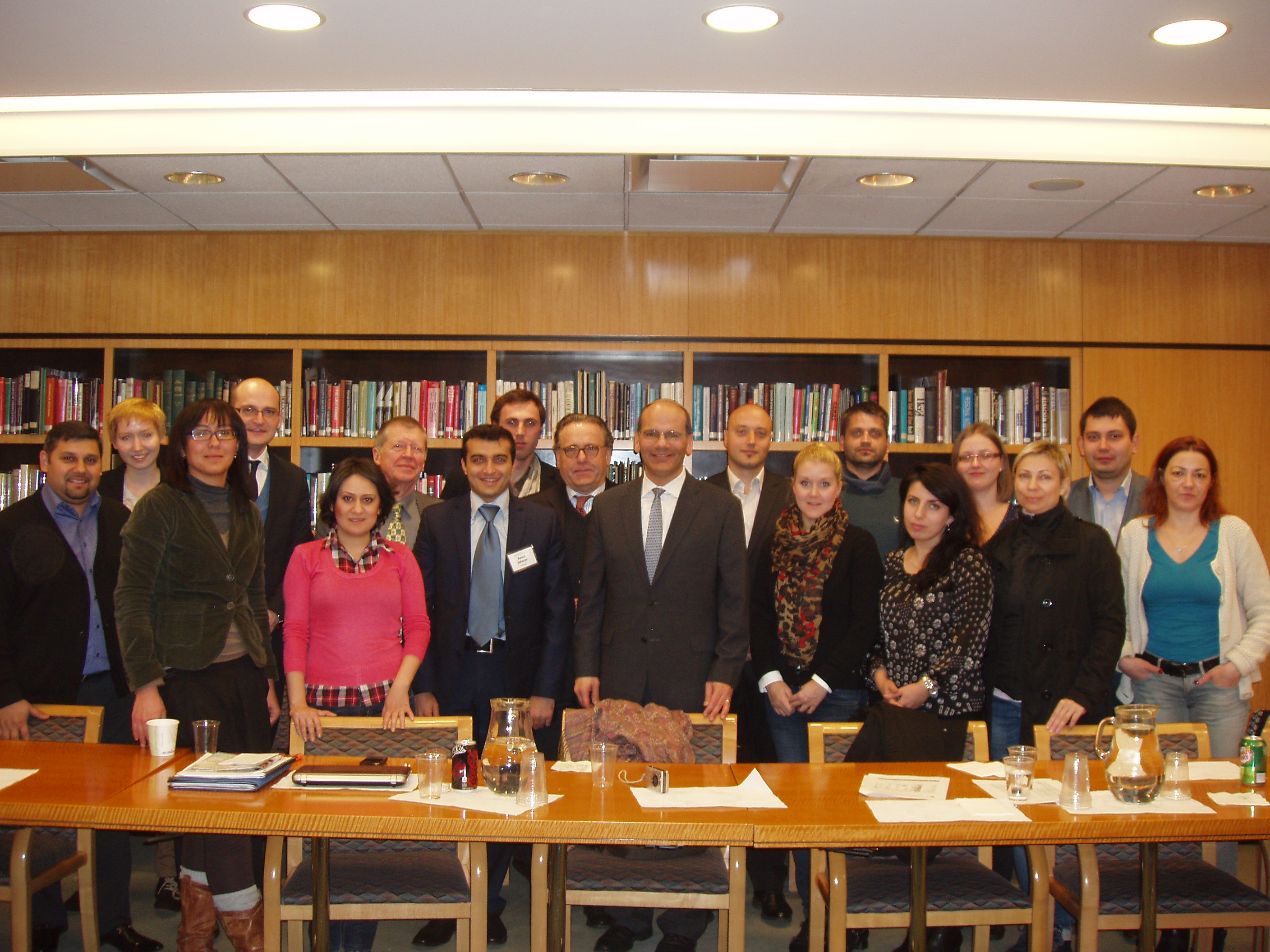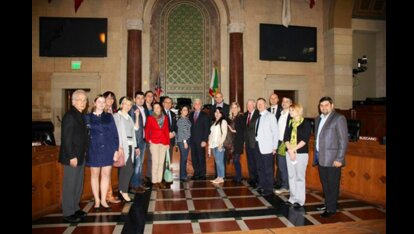Promoting Tolerance 2013

Promoting Tolerance 2013 participants
This year’s promoting tolerance programme took 14 Europeans – liberal politicians, journalists, human rights activists and academics from former communist countries – on a 10-day trip to the United States. The delegation included Rumanian MP Florin-Alexandru Alexe and the Vice President of the European Liberal Youth (LYMEC), Vedrana Gujic. For many in the delegation this was the first time in the country.
The programme has been in operation since 1992 and is a joint venture between the German Friedrich Naumann Foundation for Freedom (FNF) and the American Jewish Committee (AJC). In it the foundation’s project heads in Europe select suitable candidates who are invited to discuss and reflect upon minority issues and, more generally, the lack of tolerance to be found throughout Europe and to think about and discuss ways and means of addressing them. This is done today in two stages, the first being a qualifying round using e-learning tools and devoted to minority rights and their legal framework on the one hand and a special subject on the other.
In the past these special subjects have ranged from religious minorities and the state to minorities, equal opportunity and affirmative action. This year – motivated by the recent publications of a liberal policy paper on the issue of Roma in new member states of the European Union – the subject was the condition of and challenges presented by Roma minorities in Europe.
Promoting Tolerance 2013 participantsThe second stage consisted of a seminar in Budapest, held in June, in which successful candidates were able to deepen the knowledge they had gained and exchange views and experience in dealing with minority problems, especially those pertaining to the Roma, in their respective countries. The seminar was jointly chaired by our American host Rabbi Andrew Baker, AJC Director of International Jewish Affairs and Dr René Klaff, FNF Regional Director for the European countries targeted by the programme.
At the same time the event in Budapest prepared participants for the information trip starting in Washington on 10th November and ending in Los Angeles on the 20th.
The underlying purpose of the exercise is to provide insights into how the USA, an open society, deals with the enormous challenges of integration it has constantly faced throughout its history: the challenges posed by marginalised minorities, eg, the Afro-Americans up until and after the successes of the civil rights movement, and those posed by huge immigrant communities with very different cultural and religious backgrounds. Not an easy task, the successes have been enormous. The American model is based more on focusing on individual rights, especially those of direct relevance to equal opportunity, and on assimilation, whereas European countries have, in the main, focused on maintaining and preserving separate identities and peaceful coexistence rather than on assimilation. At the same time, the American approach is characterised by community initiative whereas European countries tend to adapt a statist approach to resolving issues that threaten to cause division.
The hope is that the comparison of European and American experiences will lead to a better understanding of the challenges we face in promoting tolerance and respecting rights and to insights on the kind of things that can usefully be done in order to improve relations between different communities.

This year the delegation to the United States included representatives from the Czech Republic, Serbia, Romania, Slovakia, Bulgaria, Croatia and several former Soviet republics - Georgia, Russia, Kyrgyzstan, Azerbaijan, Armenia and Ukraine. They were accompanied by the FNF project director for Central Europe, Dr Borek Severa, and by the author of this short report, Stefan Melnik, who has been responsible for developing and leading parts one and two of the programme over the last four years.
Three of the major themes permeating the entire 10 day programme in the United States were those of voluntarism, immigration and civil rights. The group were thus guests of various organisations in Los Angeles devoted to combatting racism and homophobia – Homeboy Industries, Community Advocates, Inc., the Korean Churches for Community Development, the L.A. Gay and Lesbian Centre, the Gay and Lesbian Alliance Against Defamation. It was instructive to see how the city over the last two decades had addressed the issues that played an importance role in triggering the violence that followed the acquittal of the police who had mishandled Rodney King after his arrest in 1991. It was also instructive to see how the gay and lesbian community had successfully campaigned for recognition and respect over the last several decades and how it is continuing the struggle today. The care taken in the casting of homosexuals in Spanish-language TV programmes was one of many examples of what and how things can be done at a practical level.
Another thread during the visit was “advocacy” as a set of campaigning tools, what they consist of, and what it is that the various organisations we met were in fact promoting. The various skills required for effective advocacy is, as it happens, of enormous practical relevance to the needs of emerging civil society and civic activists in post-communist societies. Myroslav Horvat summarised the impressions that this aspect of the information programme left on its participants in the following words: “As a journalist and public figure in my country I was struck by the fact that contact between NGOs and the government in the USA is very powerful. The level of influence of the “NGO sector” on social processes, including politics, is much higher than ours.”
Advocacy was the topic of discussion with representatives of organisations working on behalf of Latin American and various Asian immigrant communities. Advocacy knowhow is provided by the AJC and is based on many years of experience of successful use and refinement of the tools in question. It is a direct benefit to those organisations involved in the coalition-building activities initiated or co-sponsored by the AJC. It enables better and more effective mobilisation of public opinion and lobbying. Working in coalitions, a part of advocacy properly pursued, provides more clout.
The coalition-building focus on creating win-win-situations among people with interests that sometimes differ considerably is one of the secrets of success in driving change. This, as participants learned, applied in the past, eg, in the civil rights movement in which the AJC played a significant role, and continues to apply today.
Picture by Florin-Alexandru AlexeThis leads me to comment on another special focus of the trip: the life of the Jewish community in the United States. As Dr Steven Bayme and Rabbi Noam Marans, both AJC, explained during a meeting in New York, Jews have found a home in America and in Israel in which they feel safe and respected. They are worried by instances of anti-semitism throughout Europe, sometimes even growing anti-Semitism as in Hungary, despite the lessons of the Holocaust and are committed to campaigning against anti-Semitism and anti-racism. To dismiss anti-Semitism as unimportant would be tantamount to disregarding the lessons that history provided. The AJC and, indeed, all Jewish organisations advocate the strict monitoring and determined combatting of prejudice and hatred wherever it exists. The AJC plays are very active role in both the Council of Europe and the Organisation for Security and Cooperation in Europe.
The Jewish community faces very specific problems in the USA, partly as a result of the success with which the community has become an integral part of American society. The fact that more than half of American Jews have non-Jewish spouses is an indicator of this success, but this is perceived as a long-term threat to the integrity and identity of the Jewish community. This threat, together with the fact that a very large number American Jews are very secular in their beliefs, is a grave one in the eyes of many religious and other leaders.
American Jews are deeply committed to protecting Israel’s security and this is the most important issue that unites what is otherwise a very heterogeneous community.
The issue of the Roma is one that America’s Jewish communities and the American administration has by no means neglected and, indeed, there are a lot of parallels the old and new world experiences of Jews and Roma. The Roma, as documented by the Holocaust Museum, faced the same fate as the Jews of Europe did after the Nazi seizure of power. The American administration, as the delegation discovered during its meeting with members the Helsinki Commission in Washington, is very critical of the way the Roma are treated in Europe and, at a more general level, highly frustrated by the fact that European governments take a back seat in human rights issues when they are discussed by the Organisation of Security and Coooperation in Europe. “There is no effective way of dealing with human rights problems if all you can get is agreement on the lowest common denominator” was a critical comment by our American hosts that hit hard.
As our Roma participant, Myroslav Horvat from Ukraine, discovered, the Roma community are not only well-integrated in the USA, but also highly successful in business. He was able to meet Jamie Sztojka, President of the World Roma Federation and President of the World Roma Chamber of Commerce and became a member of the World Federation and its representative in Ukraine.
Picture by Florin-Alexandru AlexeThe information tour took the group to Washington, New York, Dallas (for some St. Louis or Miami) and Los Angeles and included, apart from the many meetings with representatives of the AJC and many other organisations, a number of further theme-related highlights: the Holocaust Museum in Washington, Lower Manhattan (as the entry point of many of the country’s European and Asian communities), a Southern Baptist Megachurch, the Sixth Floor Museum documenting the assassination of President Kennedy (both in Dallas) and participation in a Shabbat ceremony. It also included a briefing on city politics in Los Angeles by Councilmember Paul Kerkorian at the City Hall, a highlight that gave participants unusual insights on the political process and how different it could be: There are only 15 elected council members dealing with the affairs of almost 4 million inhabitants. They do so in a manner that is almost devoid of partisanship. Council sessions are always open to the public. Representatives are always challenged by the possibility of a direct democratic vote on many of the issues they deal with. This is not without its problems, however. One of these is balancing the budget and here solutions are very difficult to find and implement because of the say that citizens have through direct ballots.
The programme is designed to broaden and enrich the outlook of its participants and to show how things can be done when campaigning for greater tolerance in one’s own societies. This is important, given the widespread disappointment, cynicism and lethargy we often witness in post-communist societies. “Why on earth should we try to change things? They won’t change” is a common sentiment. Promoting Tolerance helps young active citizens who aspire to leadership in their respective fields to see a model of civil society in practice. In the United States civil society is dynamic. If people identify a problem, not all of them will care. But enough will care in order to make a difference. The message of the trip was that it is always worth your while to fight for the ideals you believe in – and, more often than not – you will succeed. Don’t wait for the Government. It will act eventually – but only if citizens persuade it to do so. This is the message everyone – starting with the AJC and ending with civil rights activists in Los Angeles – left us with: whether they were combatting prejudice, racism, homophobia, street violence or drug addiction."
by Stefan Melnik